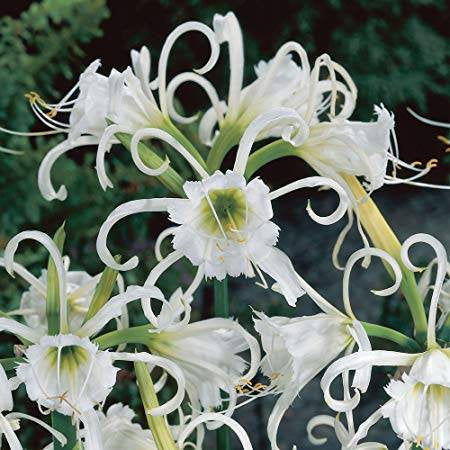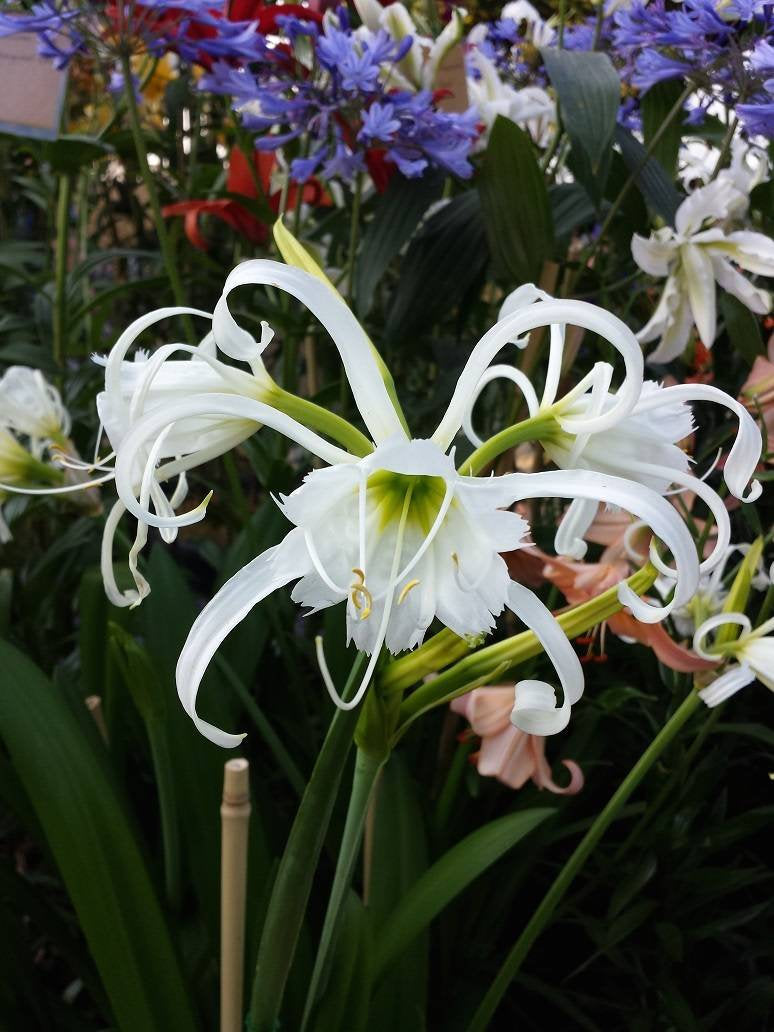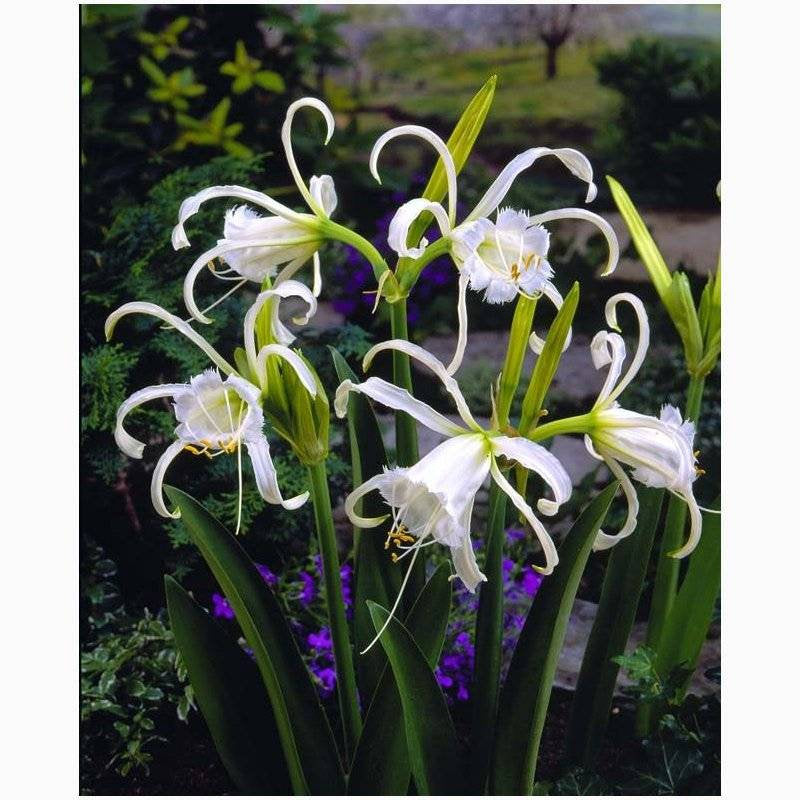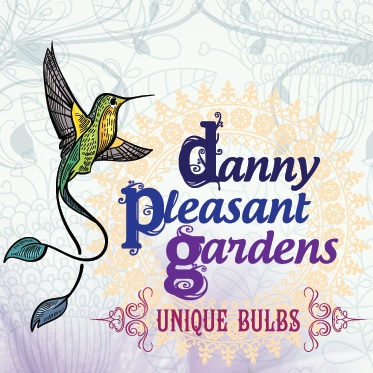

Hymenocallis Zwanenburg Ismene Spider Lily bulb fragrant flowers Peruvian Daffodil Amaryllis Family Unusual Plant Grow in Garden/Container
PRICE BREAK ON QUANTITY
1 BULB * 3 BULBS OR 5 BULBS
Hymenocallis × festalis 'Zwanenburg'
Common Name: Spider Lily, Peruvian Daffodil
Type: Bulb
Bulb Size: 18/+ cm in circumference
Family: Amaryllidaceae
Zone: 8 to 10
Height: 2.00 to 2.50 feet
Spread: 1.00 to 1.50 feet
Bloom Time: July to August
Bloom Description: White
Sun: Full sun to part shade
Water: Medium
Maintenance: Medium
Suggested Use: Annual
Flower: Showy, Fragrant
Culture
Reliably winter hardy to USDA Zone 8. Best grown in moist, humusy, well-drained soils in full sun to part shade. Soils must never be allowed to dry out. Plant bulbs 4” deep and space 8-12” apart in mid-spring. Garden grown bulbs must be lifted in fall after foliage die back and before first frost. Dig carefully (try to retain as much root as possible), dry and store in a cool, dry location (high 50s) in a dry medium such as peat or perlite. For containers, plant in spring with the necks of the bulbs slightly above the soil surface.
Container grown bulbs may be overwintered in the containers by withdrawing moisture as the foliage begins to die back and storing pots indoors in a cool, dry location.
Noteworthy Characteristics
Hymenocallis x festalis is commonly called spider lily, basket lily and Peruvian daffodil. It is a deciduous, bulbous, hybrid perennial of garden origin that looks like a spidery daffodil with extremely narrow perianth (petal-like) segments. Features a basal clump of linear, strap-shaped, amaryllis-like leaves (each to 36” long) growing directly from the bulb. In summer, from the center of the foliage rises a solid scape (to 30” tall) that is topped by an umbel of 2-5 fragrant, white, spidery flowers (to 5” across). Each flower has six (6) extremely narrow, outward-spreading-to-reflexed perianth segments and a daffodil-like staminal center cup (corona). Synonymous with and formerly known as Ismene x festalis.
Genus name comes from the Greek words hymen meaning a membrane and kallos meaning beauty in allusion to the membrane uniting the stamens.
Specific epithet means festive, gay or bright.
‘Zwanenburg’ is noted for having large white flowers with scalloped-edged cups.
Problems
No serious insect or disease problems. Snails, caterpillars and mealy bugs are occasional visitors.
Garden Uses
Best in borders, open woodland gardens. Containers.
1 BULB * 3 BULBS OR 5 BULBS
Hymenocallis × festalis 'Zwanenburg'
Common Name: Spider Lily, Peruvian Daffodil
Type: Bulb
Bulb Size: 18/+ cm in circumference
Family: Amaryllidaceae
Zone: 8 to 10
Height: 2.00 to 2.50 feet
Spread: 1.00 to 1.50 feet
Bloom Time: July to August
Bloom Description: White
Sun: Full sun to part shade
Water: Medium
Maintenance: Medium
Suggested Use: Annual
Flower: Showy, Fragrant
Culture
Reliably winter hardy to USDA Zone 8. Best grown in moist, humusy, well-drained soils in full sun to part shade. Soils must never be allowed to dry out. Plant bulbs 4” deep and space 8-12” apart in mid-spring. Garden grown bulbs must be lifted in fall after foliage die back and before first frost. Dig carefully (try to retain as much root as possible), dry and store in a cool, dry location (high 50s) in a dry medium such as peat or perlite. For containers, plant in spring with the necks of the bulbs slightly above the soil surface.
Container grown bulbs may be overwintered in the containers by withdrawing moisture as the foliage begins to die back and storing pots indoors in a cool, dry location.
Noteworthy Characteristics
Hymenocallis x festalis is commonly called spider lily, basket lily and Peruvian daffodil. It is a deciduous, bulbous, hybrid perennial of garden origin that looks like a spidery daffodil with extremely narrow perianth (petal-like) segments. Features a basal clump of linear, strap-shaped, amaryllis-like leaves (each to 36” long) growing directly from the bulb. In summer, from the center of the foliage rises a solid scape (to 30” tall) that is topped by an umbel of 2-5 fragrant, white, spidery flowers (to 5” across). Each flower has six (6) extremely narrow, outward-spreading-to-reflexed perianth segments and a daffodil-like staminal center cup (corona). Synonymous with and formerly known as Ismene x festalis.
Genus name comes from the Greek words hymen meaning a membrane and kallos meaning beauty in allusion to the membrane uniting the stamens.
Specific epithet means festive, gay or bright.
‘Zwanenburg’ is noted for having large white flowers with scalloped-edged cups.
Problems
No serious insect or disease problems. Snails, caterpillars and mealy bugs are occasional visitors.
Garden Uses
Best in borders, open woodland gardens. Containers.


